Forces and Motion | Term 1 Unit 2 | 6th Science - Student Activity | 6th Science : Term 1 Unit 2 : Forces and Motion
Chapter: 6th Science : Term 1 Unit 2 : Forces and Motion
Student Activity
Activity 1
Can you identify whether it is push or pull that results in motion in the following cases?
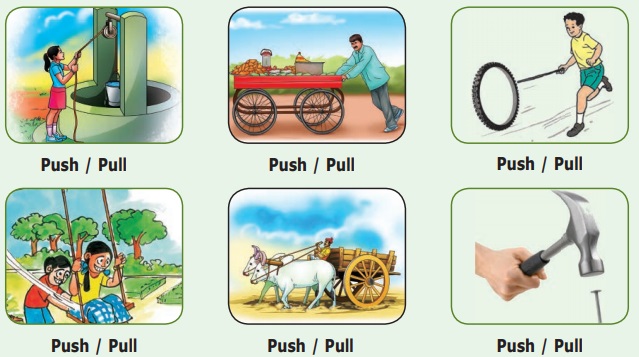
When there is a change of position of an object with respect to time, then it is called motion, if it remains stationary it is called rest.
Answer
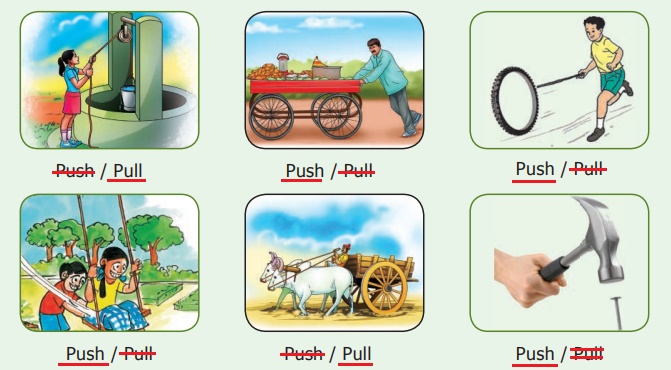
Hi! Please answer honey by observing the situation in the picture
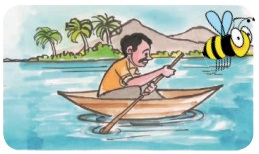
Event 1: The man in the boat is moving with respect to the bank of river. He is at rest with respect to the boat.
Event 2:
The girl on the swing is rest with respect to the seat of the swing.
She is with moving respect to the garden.

Event 3: Nisha is going to her grandmother's house by bicycle. The girl on the bicycle is moving with respect to the road.
She is rest with respect to the bicycle.
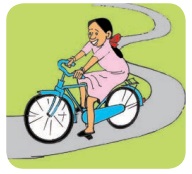
Activity 2
Moon or Cloud?
Observe the moon on a windy night with a fair bit of cloud cover in the sky. As a cloud passes in front of the moon you sometimes think it is the moon which is moving behind the cloud. What would you think if you were to observe a tree at the same time?
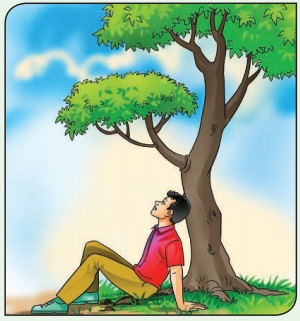
Answer:
It is a common illusion, caused by a combination of a bright moon and thin, dim clouds (usually moving fast). Your eye/brain has trouble processing difference of distance, especially in the sky, and so perceives the dim clouds as being further away than the bright moon.
Activity 3
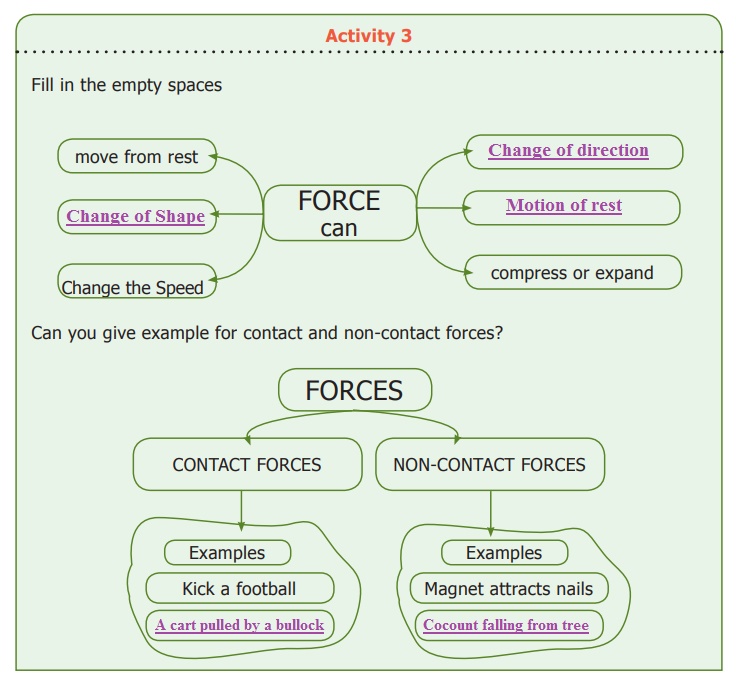
Activity 4
Play with pencil
Please do what Shanthi did...
(i). Shanthi took a pencil and sharpened it with a sharpener. (ii) Then she drew a circle using the pencil and a compass. (iii) Later she took her ruler (scale) and drew a straight line in another paper. (iv) Then she kept the pencil between her finger and moved it back and forth.

Now, look at the motion of the pencil in all these four cases. How was it?
i. In the first case, the pencil rotated in its axis.
ii. In the second case, it went in a circle.
iii. In the third case, the pencil travelled in a straight line.
iv. Fourth case, the pencil tip moved back and forth, that is it oscillated like a swing.
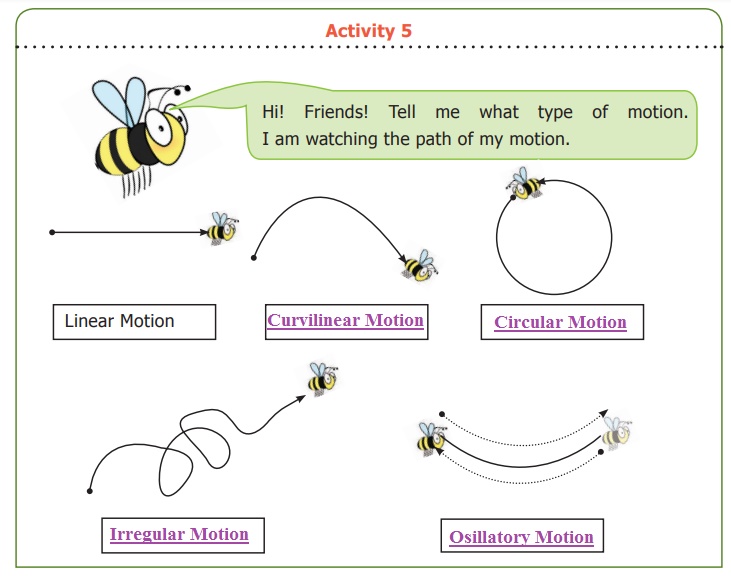
Activity 6
Classify the following according to the path it takes.
Linear ,Curvilinear, Circular,Rotatory,Oscillatory, Zigzag (irregular)
* A sprinter running a 100 m race
* A coconut falling from a tree
* striking a coin in a carom board game
* Motion of flies and mosquitoes
* Beating of heart
* Children playing in a swing
* The tip of hands of a clock
* Flapping of elephant’s ears
* A stone thrown into the air at an angle
* Movement of people in a bazaar
* Athlete running around a track
* Revolution of the moon around the earth
* The movement of a ball kicked in a football match
* Motion of a spinning top
* Revolution of the earth around the sun
* Swinging of a pendulum
* Children skidding on a sliding board
* Skidding down a playground slide
* Wagging tail of a dog
* Flapping of a flag in wind
* A car driving around a curve
* Woodcutter cutting with a saw
* Motion of water wave
* Motion of piston inside a syringe
* Bouncing ball
[add five motions you observe to this list
Answer:
A sprinter running a 100 m race - Linear motion
A coconut falling from a tree - Linear-motion
Striking a coin in a carom board game - Linear motion
Motion of flies and mosquitoes - Zigzag (irregular) motion
Beating of heart - Oscillatory motion
Children playing in a swing - Oscillatory motion
The tip of hands of a clock - Circular motion
Flapping of elephant's ears - Oscillatory motion
A stone thrown into the air at an angle - Curvilinear motion
Movement of people in a bazaar - Zigzag (irregular) motion
Athlete running around a track - Circular motion
Revolution of the moon around the earth - Rotatory motion
The movement of a ball kicked in a football match - Curvilinear motion
Motion of a spinning top - Circular motion
Revolution of the earth around the sun - Rotatory motion
Swinging of a pendulum - Oscillatory motion
Children skidding on a sliding board - Linear motion
Skidding down a playground slide - Linear motion
Wagging tail of a dog - Oscillatory motion
Flapping of a flag in wind - Oscillatory motion
A car driving around a curve - Curvilinear motion
Woodcutter cutting with a saw - Linear motion
Motion of water wave - Linear motion
Motion of piston inside a syringe - Linear motion
Bouncing ball - Linear motion
Swirling stone tied to the rope - Circular motion
Person walking on a straight path - Linear motion
Throw paper aeroplanes at an angle - Curvilinear motion
Moving in a circle - Circular motion
Throwing ball - Curvilinear motion
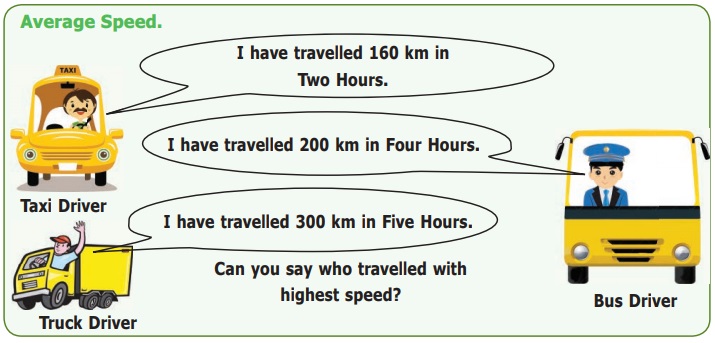
How do we say? Let us calculate how long they travelled in One Hour?
Distance travelled by the Car in One Hour = 80 Km (160/2)
Distance travelled by the Bus in One Hour =
Distance travelled by the Truck in One Hour =
Have you found out? say now.
Fastest Car, Slowest Bus.
Have you noticed that saying who is fast and slow? is easy when we calculate the distance they travelled in one hour.
Yes, it is easy when we calculate the distance they travelled in one hour.
Let us Calculate
1. A cat travelled 150 metres in 10 seconds, what is its average speed?
Solution:
Average speed (s) = distance travelled (d) / time taken (t)
= 150 metre/ 10 second
= 15 metre / second
2. Priya ride her bicycle 40 km in two hours. what is her average speed?
Solution:
Average speed (s) = distance travelled (d) / time taken (t)
= 40 km / 2 hour
= 20 km / hour
Our Speed...
Let us play a small game. Go to the playground with your friends. Mark 100 metre distance for a race. Conduct a friendly running race and calculate the time they taken to complete the distance by stopwatch. Now fill up the following table.

Compute the following Numerical Problems.
1. If you travel 10 kilometres in 2 hours, your speed is 5 km km per hour.
2. If you travel 15 kilometres in 1/2 hour, you would travel 30 km km in one hour, and your speed is 30 km. km per hour.
3. If you run fast at 20 kilometres per hour for 2 hours, you will cover 40 Km.
Multiple Motion in a Sewing Machine

* Motion of the needle
* Motion of the wheel circular motion
* Motion of footrest oscillatory motion
Activity 7
Simple Spinner
Let us enjoy by making a simple spinner. Make it by the following instruction.
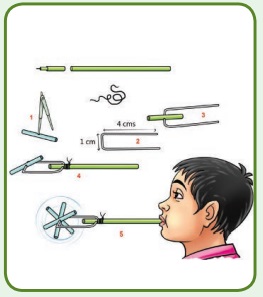
Cut a 2cm long piece from an old ball-pen refill and make a hole in its center with a divider point (Fig 1).
Take a thin wire of length 9cm and fold it into a U-shape (Fig 2).
Weave the refill spinner in the U-shaped wire (Fig 3).
Wrap the two ends of the wire on the plastic refill, leaving enough clearance for the spinner to rotate (Fig 4).
On blowing through the refill, the spinner rotates (Fig 5).
For obtaining maximum speed adjust the wires so that air is directed towards the ends of the spinner.
Have you enjoyed with simple spinner. Do you observe the motions in the toy. Can you answer the following question?
1. Motion of the air in tube is linear motion.
2. Motion of the refill stick rotatory motion.
3. The toy converts linear motion into rotatory motion.
Related Topics